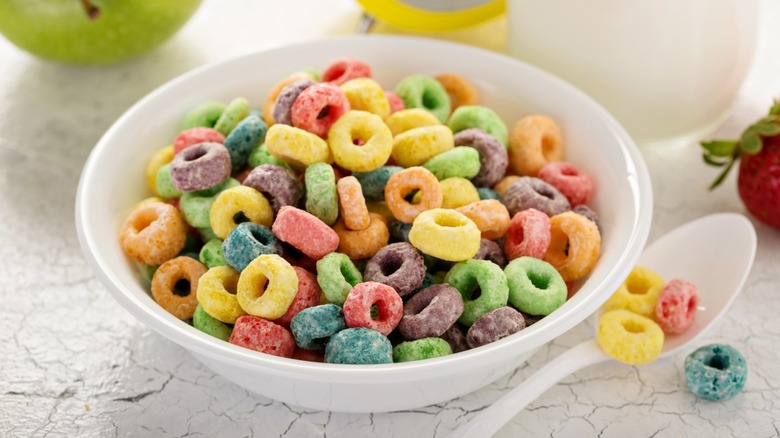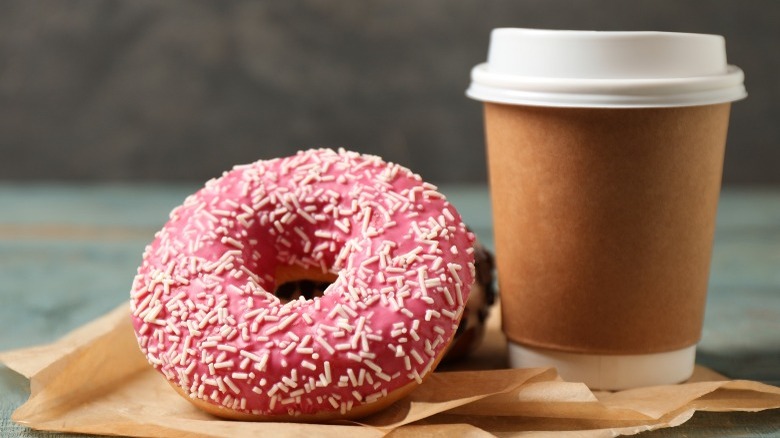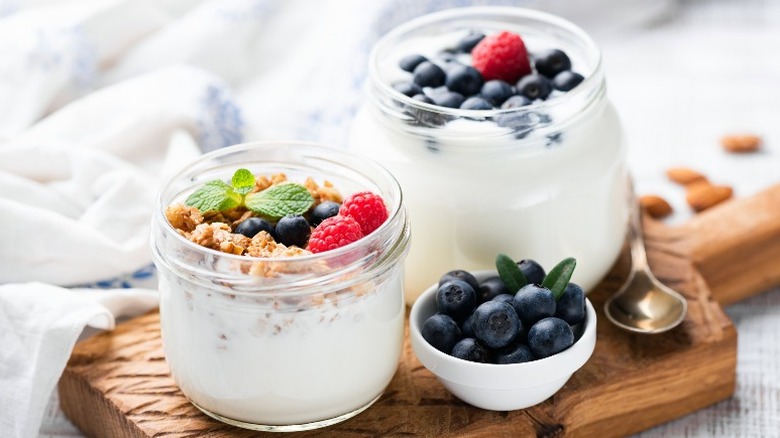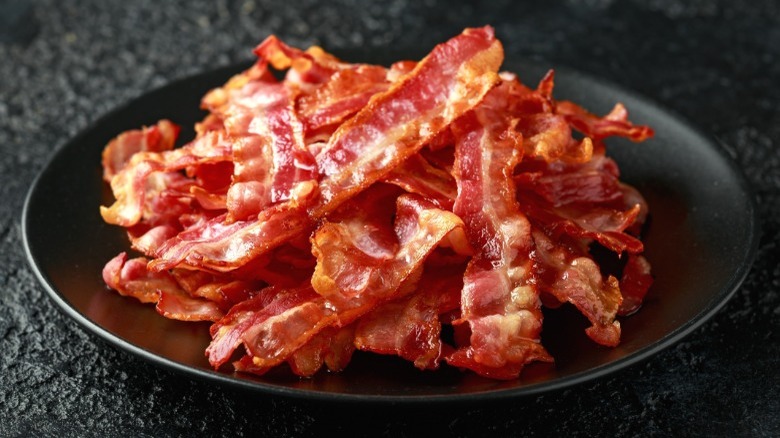Breakfast Habits That Are Bad For Your Blood Sugar Levels
You've often heard the adage that breakfast is the most important meal of the day. And it appears that you may be getting the message if you are one of the roughly 85% of Americans that reported consuming some form of breakfast on any given day, per the Centers for Disease Control and Prevention (CDC). However, simply eating breakfast doesn't mean you're doing your body good. What you choose to eat is going to have an impact on your health. Especially if you are someone who is diabetic, you will want to be extra careful about what you consume for breakfast; otherwise, your blood sugar could go through the roof. And eating breakfast only occasionally or skipping it entirely can also lead to serious health risks.
According to the experts at Medical News Today, you need a certain amount of sugar, or glucose, in your blood to supply your body with energy, but it is important to maintain normal levels. If you don't, you are at risk of developing diabetes or heart problems. The way the process works is that sugar in the food you digest goes right into your bloodstream, raising your blood sugar levels. Insulin then transports this glucose to your cells, which then allows your blood sugar to normalize.
Whether or not you are diabetic, making sure you maintain normal blood sugar levels is key to supporting your health. And you can get the day off on the right foot by avoiding these bad breakfast habits.
Your breakfast doesn't have enough fiber
According to the experts at Mayo Clinic, getting enough fiber in your diet is essential for a whole host of bodily functions, including supporting healthy bowel movements. High-fiber foods also help you maintain bowel health, which means you are less likely to get hemorrhoids and may even lower your risk of colon cancer. Foods high in fiber also help control your cholesterol and blood sugar levels. How much fiber you should be consuming each day depends on your age and gender, with women requiring a minimum of 21 grams a day and men 30 grams a day.
According to MedicineNet, examples of breakfast foods that are high in fiber include whole-grain toast and whole-grain cereals. Pretty much whole-grain or whole-wheat versions of anything — pancakes, muffins, bagels — are going to be great choices. Fruits and vegetables are also excellent choices, especially if you can eat the peel, which is going to give you an extra shot of fiber.
What you need to avoid are things like white toast with jam and cereals with added sugar. Without balancing these foods with at least some fiber, the carbohydrates will surge into your bloodstream, causing your blood sugar levels to skyrocket and then plummet. Over time, this can wear out your body's natural ability to manage these spikes, per Eat This, Not That!
You start your day with a doughnut and sugary coffee
You may think there's nothing like a freshly-baked doughnut or blueberry muffin coupled with a sweetened coffee to get your day off on the right foot, but if this is what you call breakfast on a consistent basis, you are not doing your health any favors. Not only is the added sugar in these items going to wreak havoc on your blood sugar levels, but the cycle of spiking energy caused by this sugar bomb followed by the inevitable crash and sense of sluggishness could also lead you to overeat during the day, Jerlyn Jones, a registered dietitian nutritionist, told Newsweek. Additionally, because doughnuts and pastries are made with refined flour, any inherent fiber has been stripped away. Eating foods like this on a regular basis will put you at a higher risk of developing type 2 diabetes, cancer, and heart disease.
If you can't break free of your sweet doughnut cravings, see if you can get into a healthier, naturally sweet alternative. For instance, make energy balls by combining dried, unsweetened fruit with oats, honey, and flax seeds. Or make a cinnamon toast by using wheat bread with just some cinnamon and no sugar. However, if you must have a doughnut once in a while, try to find a version — or make your own at home — that is baked rather than fried in oil and made with whole-grain flour, per SFGate.
You're not consuming enough protein
While you may associate getting your protein intake with lunch or dinner, it is also key to eat protein as part of a well-balanced breakfast.
A study published in The American Journal of Clinical Nutrition revealed that participants who consumed protein for breakfast had better blood sugar levels after consuming white bread than those who ate white bread and did not have a high-protein breakfast, indicating that eating protein for breakfast improves the body's response to high-carbohydrate foods.
Additionally, the experts at Healthline report that including protein as part of a balanced breakfast — especially if you consume a high-protein breakfast — has been shown to help in losing weight because protein helps you feel fuller longer and curbs cravings. Also, the higher the protein quality, the more you may be able to attack that stubborn belly fat. Eating protein for breakfast can also potentially speed up your metabolism since protein requires more energy to digest.
Examples of some protein-packed meal ideas you can make part of a well-balanced breakfast include Greek yogurt on its own or as an ingredient in whole-grain pancakes, a breakfast burrito made with a whole wheat tortilla, or one scrambled egg, and leftover chicken or steak from the night before. Or, try adding your favorite nut butter spread to a whole wheat waffle or whole grain toast, per WebMD.
You eat foods with too many unhealthy fats
The siren song of bacon and sausage is hard to resist — we know! But eating processed meats like these can lead to serious health risks. Processed meats have been salted, smoked, or include chemical preservatives. Research reveals that eating a 1.8-ounce daily serving of processed meats like bacon or sausage could increase your risk for heart disease by 42%. You are also close to 20% more likely to develop diabetes, per Harvard Health.
If you can't quite pull yourself away from bacon, you might want to try giving healthier alternatives a shot. While turkey bacon is not the healthiest option, it could be a good bacon substitute. According to Prevention, because turkey is white meat, it has only 4 grams of saturated fat, compared to regular pork bacon, which has 8 grams of fat. Additionally, turkey bacon has fewer calories. However, if you want a healthy option, try tempeh. Marinate the meatless soybean-based food in a yummy, savory sauce and then prepare it on the stove the same way as pork bacon. This option provides a solid serving of protein, fiber, and vitamins. As far as sausage, Joan Salge Blake, a clinical professor of nutrition at Boston University, recommends turkey or chicken-based sausage or plant-based sausage for a lower fat alternative to pork sausage. Just keep an eye on the sodium, per AARP.
You skip eating breakfast
If you're one of those people who skips breakfast entirely, you're not alone. According to Statista, 62% of Americans in 2017 reported skipping breakfast during the workweek. But skipping breakfast can lead to health risks in the long run. The results of a 2019 study published in the Journal of the American College of Cardiology revealed that people who skip breakfast on a regular basis are at a higher risk for heart disease. Skipping breakfast could also lead to obesity because you are hungry later in the day. Additionally, skipping breakfast is linked to a higher risk of developing type 2 diabetes due to the impact of regular morning fasting on insulin sensitivity, per HealthDay.
One of the biggest reasons people skip breakfast is a lack of time. If you're a member of this group, there are ways to address this to help you get some nutrition and maintain your blood sugar levels before you head out for the day. A healthy cereal with low-fat milk is an easy option. For a protein boost, go for Greek yogurt topped off with your favorite berries for added vitamins and sweetness. And making an egg doesn't have to be a morning hassle. Prepare a hard-boiled egg the night before for an easy grab-and-go breakfast. If you find you do have some time before going to work, make avocado toast or a healthy breakfast smoothie in 10 minutes or less, per Food Network.






